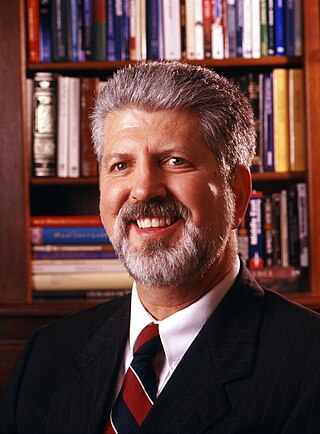Related Research Articles

Borderline personality disorder (BPD), also known as emotionally unstable personality disorder (EUPD), is a personality disorder characterized by a pervasive, long-term pattern of significant interpersonal relationship instability, a distorted sense of self, and intense emotional responses. Individuals diagnosed with BPD frequently exhibit self-harming behaviours and engage in risky activities, primarily due to challenges in regulating emotional states to a healthy, stable baseline. Symptoms such as dissociation, a pervasive sense of emptiness, and an acute fear of abandonment are prevalent among those affected.

Narcissistic personality disorder (NPD) is a personality disorder characterized by a life-long pattern of exaggerated feelings of self-importance, an excessive need for admiration, and a diminished ability to empathize with other people's feelings. Narcissistic personality disorder is one of the sub-types of the broader category known as personality disorders. It is often comorbid with other mental disorders and associated with significant functional impairment and psychosocial disability.
Antisocial personality disorder is a personality disorder characterized by a limited capacity for empathy and a long-term pattern of disregard or violation of the rights of others. Other notable symptoms include impulsivity and reckless behavior, a lack of remorse after hurting others, deceitfulness, irresponsibility, and aggressive behavior.

The Institute of Psychiatry, Psychology & Neuroscience (IoPPN) is a leading centre for mental health and neuroscience research, education and training in Europe. It is dedicated to understanding, preventing and treating mental illness, neurological conditions, and other conditions that affect the brain. The IoPPN is a faculty of King's College London, England, and was previously known as the Institute of Psychiatry (IoP).
Gordon Barraclough Parker AO is an Australian psychiatrist who is scientia professor of psychiatry at the University of New South Wales (UNSW).
Glen Owens Gabbard is an American psychiatrist known for authoring professional teaching texts for the field. He is Clinical Professor of Psychiatry at Baylor College of Medicine in Houston, Texas, and is also training and supervising analyst at the Center for Psychoanalytic Studies in Houston.

Claude Robert Cloninger is an American psychiatrist and geneticist noted for his research on the biological, psychological, social, and spiritual foundation of both mental health and mental illness. He previously held the Wallace Renard Professorship of Psychiatry, and served as professor of psychology and genetics, as well as director of the Sansone Family Center for Well-Being at Washington University in St. Louis. Cloninger is a member of the evolutionary, neuroscience, and statistical genetics programs of the Division of Biology and Biomedical Sciences at Washington University, and is recognized as an expert clinician in the treatment of general psychopathology, substance dependence, and personality disorders. Dr. Cloninger is currently professor emeritus.
Personality disorders (PD) are a class of mental disorders characterized by enduring maladaptive patterns of behavior, cognition, and inner experience, exhibited across many contexts and deviating from those accepted by the individual's culture. These patterns develop early, are inflexible, and are associated with significant distress or disability. The definitions vary by source and remain a matter of controversy. Official criteria for diagnosing personality disorders are listed in the sixth chapter of the International Classification of Diseases (ICD) and in the American Psychiatric Association's Diagnostic and Statistical Manual of Mental Disorders (DSM).
In psychology, manipulation is defined as subterfuge designed to influence or control another, usually in a manner which facilitates one's personal aims. The methods used distort or orient the interlocutor's perception of reality, in particular through seduction, suggestion, persuasion and non-voluntary or consensual submission. Definitions for the term vary in which behavior is specifically included, influenced by both culture and whether referring to the general population or used in clinical contexts. Manipulation is generally considered a dishonest form of social influence as it is used at the expense of others.

Lee Nelken Robins was an American professor of social science in psychiatry and a leader in psychiatric epidemiology research. She was affiliated with the Washington University in St. Louis for more than 50 years from 1954 until 2007.
Donald Jay Cohen was an American psychiatrist, psychoanalyst, and director of the Yale Child Study Center and the Sterling Professor of Child Psychiatry, Pediatrics and Psychology at the Yale School of Medicine. According to the New York Times, he was "known for his scientific work, including fundamental contributions to the understanding of autism, Tourette's syndrome and other illnesses, and for his leadership in bringing together the biological and the psychological approaches to understanding psychiatric disorders in childhood"; his work "reshaped the field of child psychiatry". He was also known as an advocate for social policy, and for his work to promote the interests of children exposed to violence and trauma.
James Frederick Leckman is an American child psychiatrist and psychoanalyst and the Neison Harris Professor of Child Psychiatry, Psychiatry, Psychology and Pediatrics at the Yale School of Medicine, recognized for his research in Tourette syndrome (TS) and obsessive–compulsive disorder (OCD).
Psychopathy, from psych and pathy, was coined by German psychiatrists in the 19th century and originally just meant what would today be called mental disorder, the study of which is still known as psychopathology. By the turn of the century 'psychopathic inferiority' referred to the type of mental disorder that might now be termed personality disorder, along with a wide variety of other conditions now otherwise classified. Through the early 20th century this and other terms such as 'constitutional (inborn) psychopaths' or 'psychopathic personalities', were used very broadly to cover anyone who violated legal or moral expectations or was considered inherently socially undesirable in some way.
The Massachusetts Council on Gaming and Health is a private, non-profit health agency that was founded in 1983. It provides information, promotes public awareness, and offers community education, professional training, advocacy and referral services for problem gamblers, their loved ones, and the greater community.

David Kennedy Henderson FRSE FRCPE was a Scottish physician and psychiatrist and served as president of the Royal College of Physicians of Edinburgh 1949 to 1951.

Reid Robison is an American board-certified psychiatrist known primarily for his work with psychedelic medicines. As an early adopter and researcher of the use of ketamine in psychiatry, Robison has made significant contributions to ketamine-assisted psychotherapy (KAP) and other treatment modalities using ketamine for mental health conditions. He previously served as coordinating investigator for a study on MDMA-assisted psychotherapy for eating disorders, sponsored by the Multidisciplinary Association for Psychedelic Studies (MAPS), and he continues to lead research and psychiatric clinical trials involving psychedelics. To date, Robison has guided thousands of ketamine-assisted therapy sessions and Spravato dosing sessions. He currently serves as Medical Director of Center for Change, an eating disorder treatment center in Utah, and Chief Clinical Officer of Numinus, a Vancouver-based mental health company focused on psychedelic research and treatments. Robison is an adjunct professor at both the University of Utah and Brigham Young University.

Eric M. Plakun is an American psychiatrist, psychoanalyst, researcher and forensic psychiatrist. He is the current medical director/CEO at the Austen Riggs Center in Stockbridge, Massachusetts. Plakun's primary interests include the mental health advocacy, full implementation of the mental health parity law, access-to-care issues, and reducing health disparities; the value of and evidence base for psychosocial treatments and the diagnosis, treatment, longitudinal course and outcome of patients with borderline personality disorder and treatment resistant disorders.
Paul E. Garfinkel is a Canadian psychiatrist, researcher and an academic leader. He is a professor at the University of Toronto and a staff psychiatrist at Centre for Addiction and Mental Health (CAMH).
Andrew E. Skodol is a professor of psychiatry at the University of Arizona and Columbia University. Skodol is a member of the American Psychiatric Association, American College of Psychiatrists, and the World Psychiatric Association. He was also the President of the Association for Research on Personality Disorders and, in 2017, the American Psychopathological Association. He graduated from Yale University and the University of Pennsylvania. Skodol received his psychiatric training at the Albert Einstein College of Medicine, where he worked as an assistant professor until 1979, when he transferred to Columbia. Becoming a professor of Clinical Psychiatry from 1995 to 2007. From 2007 to 2008 he was the president of the Institute for Mental Health Research, and from 2008 to 2011 he helmed the Sunbelt Collaborative. Skodol helped write the DSM-5 and served as the chair for its work group on personality and Personality Disorders. While writing the DSM-5 he argued for the removal of Narcissistic personality disorder. From 2000 to 2003 he was the deputy director of the New York State Psychiatric Institute. He also is the chair of the Collaborative Longitudinal Personality Disorders Study. With his research primarily focused on diagnosis, stress and psychosocial functioning, Borderline personality disorder, Avoidant personality disorder, Major depressive disorder, Schizotypal personality disorder, Schizophrenia, and personality disorders. Skodol also worked to identify differing levels of severity amongst personality disorders, new personality disorder traits, new types of personality disorders, and new general personality disorder criteria.
William B. Lawson is an American professor, psychiatrist and a Distinguished Life Fellow of the American Psychiatric Association (DLFAPA).
References
- ↑ "Black, Donald W., 1956-". Library of Congress Name Authority File. Retrieved 2020-02-17.
- ↑ "Donald Black". University of Iowa. Retrieved 2020-02-17.
- 1 2 3 "Donald W. Black, MD". AACP. Retrieved 17 February 2020.
- ↑ "Psychiatrist to study pathological gamblers". Las Vegas Sun. 2000-09-18. Retrieved 2020-02-17.
- ↑ "NCRG HONORS DONALD W. BLACK WITH 2016 SCIENTIFIC ACHIEVEMENT AWARD". ICRG. 2016-09-22. Retrieved 2020-02-17.
- 1 2 "Donald W. Black, MD". Global Academy for Medical Education. Retrieved 2 July 2021.
- ↑ "EDITOR – AACP" . Retrieved 2023-06-12.
- ↑ Saeed, Ahmed; Black, Donald W. (July 2019). "Career Choices: Academic psychiatry". Current Psychiatry. Retrieved 2 July 2021.